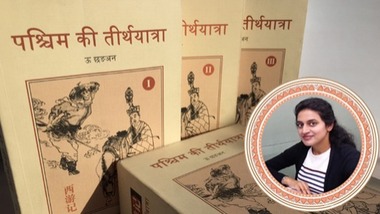China approached the issue of poverty from a multi-dimensional side: UNRC in China
Siddharth Chatterjee has been the United Nations Resident Coordinator in China since January 16, 2021. He is the highest-level resident representative of the United Nations development system.
In an exclusive interview with the China Media Group reporter Akhil Parashar (CMG), Siddharth Chatterjee (Siddharth), UNRC in China, acknowledged China's poverty alleviation efforts amid the COVID-19 pandemic.
He praised China's achievements in poverty alleviation as a major contribution to the global cause of poverty alleviation and an important inspiration for other developing countries to get rid of poverty.
He also said China's poverty alleviation experience has provided substantial reference for other developing countries. The representative also touched on the UN's role in helping China shake off poverty, ways China and the UN can jointly deal with climate challenges, and how China and the UN can cooperate in minimizing the impact of COVID-19.
The Transcript of exclusive interview with UNRC Siddharth Chatterjee is following:
CMG: In one of your articles, you have said that when you arrived in China, you were not afforded any preferential treatment. You were subject to the same requirements mandating certificate proof of a negative COVID-19 nucleic acid and IgM antibody test issued no more than two days before travel. How was your experience and what have you witnessed while arriving in China?
Siddharth: Thank you for having me on your show. What COVID-19 this microscopic virus has done is it also does not discriminate between rank or person status. It has permeated some of the highest institutions and the highest leadership in countries in different parts of the world. So it is clear that a public health response must have everybody at the same equal level. And that equal level means being put through the same regimen of testing right from the beginning. So I have to say that I commend China's public health response, primarily because the testing didn't start when I arrived in China. The testing started even before when I was in Kenya. That is where my formal duty station was. So in Kenya, I traveled, I had my IgM test and then NAT test. And then I came to Dubai because I had to break the journey in Dubai. After all, there was no direct connecting flight, which I had to repeat the tests all over again, even at the airport. And the process of checking it was a very rigorous process of checks and making sure that people had the green code and then arriving in Guangzhou, which I came. This is my first time in China. I was quite impressed by the professionalism, by the level of knowledge, by the approach taken by not just one entity of the government, but different entities coming together to make sure that things moved smoothly, things moved effectively, but the testing process was in place and from there was minimal contact. We were moved straight to the quarantine hotel. And to me, those three weeks were very important because it allowed me it was the first time I had experienced a quarantine ever. And, you know, three weeks in a hotel room was quiet for me. Personally, it was one of the best periods I've ever experienced, simply because Kenya had been very, very busy. You know, you have a small sun. You know my work Kenya was looking at a triple emergency, which included not just COVID, but a major locust invasion and floods. So it had kept me very busy. So it allowed me to slow down. And, you know, I could read a hardcover book. But what I realized was the sequence of constant temperature monitoring twice a day, you know, all that minimal aspects, all those minimum requirements to make sure that the isolation and quarantine are effective. There's no point in going into quarantine if you are still intermingling with people. So by the time I came out of my three weeks, I must say that I came down from the hotel room and someone from the Ministry of Foreign Affairs was there to receive me downstairs, and he put out his hand to shake my hand. And I was reluctant because for one year in Kenya, for example, he had stopped any form of physical contact wearing a mask, you know, keeping physical distancing. And that's when I realized how the effectiveness of a public health response should be that in China, actually, by and large, people have gone back to a level of normality, yet at the same time maintaining all the preventive measures. And I think the future of pandemics will be how effective we are on the prevention side. So in many ways, China is setting a model which many other countries can emulate. And not just that. If every country observed the same discipline and regimen as China, I think we would flatlander the curve. But I also have not just to commend the leadership of the Chinese government, but also the people for their self-awareness and discipline, and ability to accept these strict measures. And that is what is making China successful in managing this pandemic.
CMG: In February, China announced victory in the fight against absolute poverty. This achievement has attracted worldwide attention, bringing benefits to the world as a whole. Recently, UN Secretary-General Antonio Guterres congratulated President Xi Jinping on this significant milestone. Sir, How do you evaluate the efforts of China in the fight against extreme poverty?
Siddharth: You know, President Xi Jinping has to be commended that in the last seven years, he has able to transform the lives of a hundred million people. And you know, what is most important in this is political will. So when you look at China over the last 40 years and the fact that it has managed to bring about eight hundred million people out of absolute poverty is quite a remarkable achievement. And this must be shared. This must be spoken about. It must stand up as a role model for many other countries that are working hard to end poverty. Because when you end poverty, you end many things. You end inequality, you end, you know, marginalization, you end exclusion. You give better opportunities for everybody to come up and join the mainstream. And as a result, one of the things that China has been also able to do is it's been able to pick up people right from. Rural side and bring them into high levels and government because they got an opportunity not only to get out of poverty but be educated, get trained, get skilled. And therefore, in many ways, you know, when we talk about human development, it is crucial that we leave no one behind. The secretary-general reminds every UN resident coordinator in the world; our role is to be fit for purpose in the country we are serving it. Number two to deliver is one. And number three, to leave no one behind. China in many ways is showing it by example by doing it, that it's leaving no one behind. So it deserves to be given a full commendation for this very remarkable success. And what we will do with the government of China through a cooperation framework is we do not lose the gains that China has made. So we will work very hard with the Chinese government. And it's already in the 14th five-year plan so that we minimize inequalities and make sure that we leave no one behind.
CMG: The Sustainable Development Goals are just 10 years away. What lessons can China provide the world in abolishing poverty?
Siddharth: On multiple levels. You know, it is ultimately when a nation-state embraces strong political will, the right public policies, and the right partnerships, things start to change. And I've seen this in I've served for 25 years in the UN and I've seen it in countries where there is strong political leadership and they want to see this change happen. It happens, but this must be underpinned with big data, with technology, with innovation, which is what China has done. So it's in the space of agriculture, in the space of infrastructure, in the space of manufacturing, in the space of tech, in the space of innovation. China approached the issue of poverty from a multi-dimensional side rather than one particular side, which is what, is needed. You know, you can also go hand out free food to the poorest. But what you’re doing is creating a level of dependency and which is what has happened in many parts of the world. If you go to many parts of Africa, Asia, where you still find people are very dependent on external need, but self-sufficiency means how to catalyze that external aid. And that is why, you know, the SDGs, the Sustainable Development Goals, is like the North Star. It's the polestar into which the whole world has said, let's unite, let's get to 2030. Let's make sure that the first five goals are even more critical. That's the unfinished business. Goal No.1, ending poverty. Goal No. 2, ending hunger. Goal No. 3, is making sure that everybody is healthy and fit. You know, universal health coverage. Goal No. 4, quality education and skills. Goal No. 5, gender equality. When a nation-state gets these five right, the path to prosperity is dramatic, which is what China is doing, which is what many countries in Western Europe did after the post the Second World War, which many of the Asian tigers, such as countries such as South Korea, Japan, Malaysia, Singapore, I mean, look at the phenomenal rise that has taken place. So I think it's an exciting time for the United Nations system, particularly in China, to be able to partner with China not only to address issues that will lead to China achieving the full sustainable development goals but also to share lessons from China, particularly with the development of the developing world, in how to learn lessons from this so that they could, you know, put it into their development context.
CMG: What has the UN done to help China alleviate poverty?
Siddharth: The UN family has been in China since 1979. And, you know, agencies such as UNDP, UNFPA, UNICEF, and ILO have been doing important work with the Chinese government. They have shared knowledge. They have shared people in terms of human capital. They've worked with different aspects of government. They've strengthened governance. They've looked at rural poverty issues. So at multiple levels, the UN family has been working in lockstep with the government of China. But I would add another thing. I am also very privileged as the UN resident coordinator in China to serve in a country that believes and values multilateralism. And that is, I think, where the biggest partnership between the United Nations and the government, in the spirit of embodying multilateralism. And if you heard President Xi Jinping's speech at Davos recently, 2021, which is online, he repeated emphasis on multilateralism, he repeated emphasis that we would also pass through the COVID pandemic. But once we come out of it, we must build a resilient society. We must move towards global prosperity. All this will not happen by one country or two countries doing it. All this will happen when we all unite in a common purpose that the first five goals of the SDG that I talked about will be key to making sure that we succeed across all the 17 goals of the Sustainable Development Goals.
CMG: So how will China and the U.N. work together to minimize the covid-19 negative impact?
Siddharth: So, you know, what COVID-19 has done is. It put a spotlight on health systems all over the world where we believe that certain countries that had the strongest health systems were the ones that crumbled the fastest. You know, that we understood that if you don't have people observing, You know, wearing a mask and ensuring physical distancing and maintaining respiratory etiquette, washing their hands. We found that those countries became much more vulnerable. And this is not about how societies have evolved or their academic qualifications. It is about maintaining rigor and discipline from a preventive side. So I think China has shown the world important areas into which the world could converge behind because this is not the last pandemic. There are perhaps many more zoonotic, you know, because, you know, the human population has expanded exponentially. You know, I mean, by 2050, the world's population is going to be about 10 billion. Now, if we are looking at a world population where the planet has not expanded, the earth is still the same, you know. So what is shrinking is the wildlife space, the water space. Now, we are competing with that wildlife space, you see. So that is why into this mix is going to be the primacy of ensuring that every woman has the right over her reproductive health, maternal rights, the ability to decide how many children they want, how many children they should have because ultimately they must be part of the workforce. So a from a health perspective, the health of women and children is going to be crucial. To ensure universal health coverage and therefore to me, it is going to be very relevant that the UN will continue to work with China, but making sure that the World Health Organization, which is the premier multilateral institution, strengthens, is given the authority, the resources, and the power to be able to take universal health coverage to a whole different level. Keep in mind, every year, and this is Before COVID, 100 million people get trapped into poverty because of an out-of-pocket health shock. Now, that figure must have gone up exponentially during COVID. Who would have thought that in a country like Switzerland, people would line up for food?
You know, it is. It is it is inconceivable. So perhaps even from a development model, we need to revisit how development is going to work. So, therefore, again, important parts where I would want, as the resident coordinator will be working with the coordinators not just in Asia, but in Africa to with the Chinese government looking at around the food system summit, what is it that we should be thinking of in terms of achievement of the 2030 agenda, What is it that we could do in the social socio-economic transformation of Africa? I genuinely believe I've spent a fair amount of my career in Africa that a prosperous Africa will lead to a prosperous world and therefore we have to also invest in countries and continents that are left behind. Again, I see an important role between the UN and China coming together in this space.
CMG: since the start of a covid-19 pandemic. China has offered assistance to the world, especially developing countries. So what's your take on this?
Siddharth: It's been excellent. So I was in Kenya when the COVID-19 broke out and by the end of March, there was a global breakdown of supply chains. There were no gloves. There was no PPE. There were none of those things. By the end of March, a plane arrived, you know, from Addis, and suddenly a huge amount of supplies came in. And that was most important from a public health response. We were able to equip the frontline health workers with all the basic essentials that they needed. And this was not just limited to Kenya. Support was given throughout Africa. So I take this opportunity to commend the government and the people of China for their generosity. And I think it was very timely. And now, I mean, that experience was very important. And then that is why I wrote about my experience also in quarantine when I saw a real public health response in motion. I think these are important areas to share lessons, because ultimately when health is right, as Premier Li recently said, that, you know, health is the foundation of a nation's best. And once we've got the health right, we get everything else right. So that is going to become the anchor around which we will see the success of the human race of human development and our humanity.
CMG: How have China and the UN cooperated in tackling climate change and what are the measures China is expected to take in the future?
Siddharth: Look, the environment is another place where the world could unite to work together. You know, climate, health, you know, prosperity should not be defined by politics. It should be defined by global cooperation, global partnerships. Because without that, you know, it was John Donne, the English philosopher, who once said that no man is an island. Every man is a piece of the continent. So our approach needs to be that. So the environment is crucial. We are seeing the UN secretary-general, Antonio Guterres has declared a climate emergency. We in a race against our survival and China's role is going to be critical. I'm pleased that the United States of America is back in the Paris agreement. I believe that the European Union, the US, China, you know, the Asian tigers can all come together to have a unified approach to dealing with the urgency with which we have to deal with the environment. I mean, just today we are talking about once in two decades and we have a sandstorm going on outside in Beijing, which is quite unbelievable. And, you know, people are surprised. But this is not China's unique problem. The climate is interplay. It's between the whole world. We have a shared responsibility to preserve what we have around us. So I think, again, China's leadership over here is going to be crucial. And, you know, again, reminding us what President Xi Jinping recently said in his speech to he's talking about the Green Mountains, which are the mountains of gold. And that is what it is going to be very significant to a program of reforestation, a program to make sure that our industrial activity. Instead of focusing on the second and third industrial revolution in Africa, let's go to the fourth industrial revolution directly where it becomes much more digital, it becomes the green economy, becomes the blue economy. You know, my friend. Nothing is a limitation to what we can do together. It's only our imagination.
CMG: Thank you, sir. Thanks for giving your precious time.





